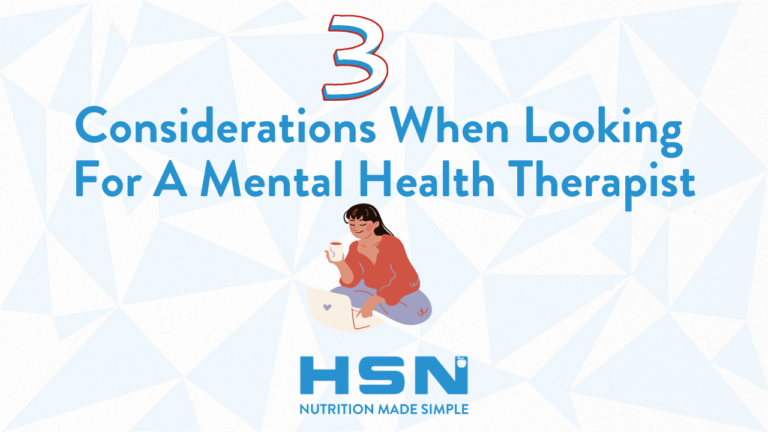Since COVID the world has seen a significant increase in those battling anxiety, depression, substance abuse, and suicide.
In 2021 Aurthur Evans Jr., the CEO of the American Psychological Association, said “We are facing a mental health tsunami”. Even further it is estimated that nearly half of adults facing such issues are not seeking out treatment.
Over the past year, we’ve had discussed mental health on the podcast multiple times; from discussing the link between depression and the food we eat with Dr. Uma Nabm on Episode 34 to Dr. Christina Migliara discussing mental health.
Exercise has been shown to be more effective than any antidepressant drug on the market, decreasing anxiety and depression by over 30% but sometimes that’s not enough.
Are you still overwhelmed with stress, anxiety or depression despite your best efforts to exercise regularly, eat a healthy and balanced diet and prioritize sleep?
Has the wild ride of the past couple of years left you feeling like nothing makes sense anymore?
Perhaps you feel isolated from working from home, missing the social connections that were a regular part of your life, or just feel anxious about the unknown future as new Covid variants run through the world like wildfire. Maybe you have lost a job or loved ones have passed away, leaving you with grief. Mostly, you long to feel like you again, living a fulfilling and meaningful life.
You think therapy might help, but don’t know how to find a therapist. Maybe you’ve tried therapy before, but the therapist just didn’t feel like a fit for you. Or perhaps you’ve never tried therapy and have no idea how to get started. And to top it off, you are worried about talking about what’s happening for you, because you are so used to handling things on your own. You are not alone. Especially with the challenges of the last couple of years, the numbers of people seeking mental health services has skyrocketed. More and more, the stigma of mental health issues is fortunately decreasing, making it easier to talk openly about.
There are a lot of very good therapists waiting for you to reach out. Not all of them will be right for you, so here is some guidance in looking for the support you need to heal and live the meaningful, fulfilling life you long for.
Where To Look For A Therapist
Friends and family truly are a great resource for recommendations, because they know you and often have some similarities. They are a wonderful place to start. But if that doesn’t help, there are other ways to search.
You can start with a simple Google search. Try terms that match the challenge you are facing – anxiety therapist, depression therapist, trauma therapist, addiction counselor, etc. in or near your city. Additionally, there are a number of directories where you can find therapists. Psychology Today is probably the largest of these. Good Therapy, Therapy Tribe, and Network Therapy are a few others that might be helpful.
What To Look For
As you review websites or directory listings, check out the credentials of the therapist. Psychologists typically have a doctoral degree, while Licensed Clinical Social Workers (LCSWs, LICSWs, depending on the state), Licensed Mental Health Counselors or Licensed Professional Counselors (LMHCs or LPCs) and Licensed Marriage and Family Therapists (LMFTs) have a minimum of a masters degree. All may be a great fit for you. Just a note: your therapist must be licensed in the state where you are at the time of any session, so it is best to search for a therapist in your home state.
You may also want to consider any additional training the therapist has completed. Sometimes, that will help you understand their therapeutic orientation and their available tools to support you.
Another option to think about is whether you prefer in-person sessions or telehealth. Both have pros and cons. Some simply prefer in-person sessions, feeling more connected to their therapist that way. For others, in-person is more beneficial due to the issues being addressed. Substance use disorders, eating disorders and suicidality are among the issues that may be best treated in person. On the other hand, teletherapy can be just as effective for most. It also offers convenience, in that, as long as you are in the state where the therapist is licensed and have a good internet connection and privacy, you can be anywhere when you meet with your therapist.
You will also want to decide how you want to pay for therapy. If you need or want to use your medical insurance, you will want to be sure that your therapist is in-network with that company or the policy offers out-of-network benefits that are affordable for you. Some out-of-network therapists will file claims on your behalf, while others will expect payment upfront and provide you with a receipt to file with your insurance company for reimbursement.
You may also have a certain number of sessions offered for free through your employer’s Employee Assistance Program (EAP). Additionally, if you prefer teletherapy, you’ll need to ensure that your carrier offers such coverage, as many do not.
Many choose to pay privately, thus avoiding the possibility of a diagnosis being recorded with an insurance company or having the insurance company having a say in the length or type of therapy, or simply because the best fit for them does not accept insurance.
If finances are getting in the way of your receiving help, there are agencies in virtually every area that provide therapy for free or on a sliding scale. Most municipalities have an information and referral service, where you can call to find out the resources near you by simply calling 211.







